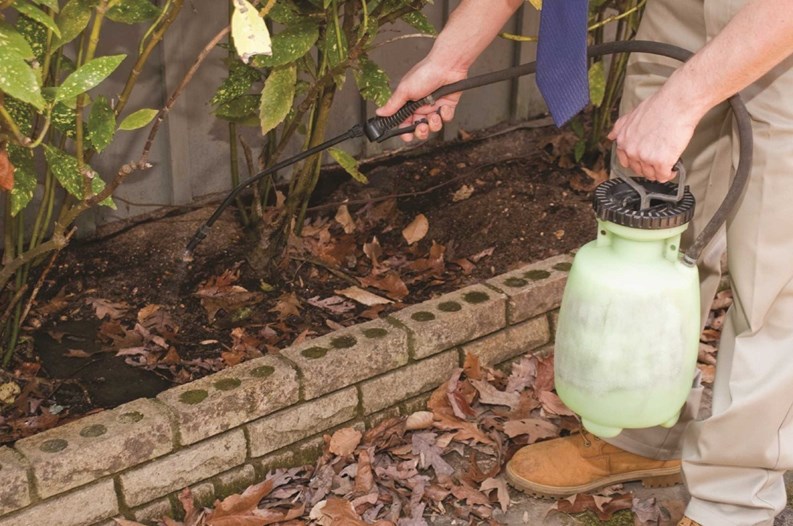Since the 1950s, American lawns have been “hooked” on petroleum-based and synthetic chemicals. A plethora of pesticides, herbicides, fungicides and fertilizers have been eagerly embraced by both homeowners and landscape professionals, who cannot resist the dramatic results—an almost instantaneous, lush, green lawn. But many industry experts today view this practice as akin to a drug addict who cannot function without a fix. Grasses became dependent on an endless feed of chemicals for their sustenance as the underlying soil became sterile.
In maintaining landscapes for the long-term, “perfect doesn’t mean healthy,” says Frank Koll, president of GreenScapes Lawn and Garden Services in Arlington, Massachusetts. He contends that organic, more natural methods of lawn care will result in a self-sustaining landscape that needs less maintenance as time goes by. “Organic products and methods cost more at first but go down over the years,” he notes, explaining that the initial cost for switching to organic starts with rehabilitating soils, and that takes some time.
An even more important reason, however, for going organic with landscape care is creating a healthier environment for people and pets. Koll says that researchers “have proven there is a direct correlation… between lawn chemicals and certain neurological diseases, cancers and other ailments.”
The fact that lawn chemicals are inherently dangerous is no secret—just read the warning labels on the packaging. Koll and other landscape experts agree that if everyone—homeowners and professionals like — adhered to the strict application methods prescribed in the products’ directions, “negative effects should be minimal to none… but most people applying [these products] have no clue what they’re doing.” Even contractors have been observed, Koll notes, “spraying right up to where kids are playing… not wearing masks and protective gear,” failing to use effective warning signs or methods to keep people and pets off treated areas. Expecting anyone to literally “follow directions” may be unrealistic, and is probably unenforceable. Koll says the U.S. Department of Agriculture is charged with overseeing commercial use of pesticides and herbicides, “but there are only about six inspectors in Massachusetts” [who are] expected to respond to violations.
In the business of lawn care, Koll reports that other industrialized nations, “are passing laws transitioning away from harmful chemicals. The U.S. is the only country that’s not promoting precautionary principles. In the U.S., we don’t want to ban homeowners the right to use or spray chemicals.” As an example, he cites legislation in Québec, which has banned the sale, and use for lawn maintenance purposes, many of the pesticides, herbicides and fungicides believed to be a threat to health. The specific products and compounds included in the phased-in Québec ban include carbaryl, cicofol, malathion, 2,4-D, chlorthal dimethyl, MCPA, mecoprop, benomyl, captan, chlorothalonil, iprodione, quintozene, and thiophanate-methyl.
Safe Application Requires a Community’s Cooperation
David J. Levy, PCAM, of Sterling Services, Inc., in Holliston, Massachusetts, notes that environmental groups are pressuring municipalities to suspend the use of chemicals and fertilizers on roadways and landscapes that may be damaging watersheds and rivers. “There are lawsuits coming from these groups,” he notes, “but the cost to clean up [in most cases] is so high it would wipe out a town’s entire budget.”
He agrees that when chemicals products are used in landscaping, “if applied properly, they won’t leach into resources areas or the water table. When hiring a landscape firm, we try to get someone who’s licensed or accredited. We only allow contractors who have a license for chemical use… We’re always pushing our vendors to a higher level.”
Safe application of lawn care chemicals within a community requires the cooperation of residents. This includes protocols for preventing contact by people and pets, and that’s where property management gets involved. “We have several ways to warn residents to avoid lawn areas during treatment periods,” Levy states, such as email blasts, phone notifications and signage.
He points out that in condo communities, “There is always [a need for] consensus-building. If you have a family member in a unit who is sensitive to chemicals, how far can you go to address just that one person’s needs? It can become an issue of balancing the rights of an individual with the needs or desires of the majority. Under the federal Fair Housing Act, in a community situation, you have to provide a ‘reasonable accommodation’ for those with disabilities. We have found that the best solution [for addressing special needs or requests] is just listening.” Managers and board members can usually reach successful consensus on a one-to-one basis.
Accommodation is Required,
But Must Be ‘Reasonable’
An example of reaching a consensus and finding a solution, by listening, is reported by Attorney Stephen Marcus, partner in the law firm of Marcus, Errico, Emmer & Brooks of Braintree, Massachusetts. He says, “We had a unit owner with a child… they were both sensitive to lawn chemicals that were used by the landscaping contractor. This is an example of ‘multiple chemical sensitivity’ syndrome, which may be considered as a real disability.”
Multiple chemical sensitivity (MCS) has been defined as a chronic medical condition characterized by certain symptoms attributed to exposure to low levels of chemicals. Commonly-suspected substances include smoke, pesticides, plastics, synthetic fabrics, scented products, petroleum products and paints. Symptoms may be vague and non-specific, such as nausea, fatigue, and headaches.
“The affected residents suspected that the lawn fertilizer was to blame. The board of directors at this community felt they needed to come up with a solution that could work for everybody,” Marcus explains. “The board decided to ask the landscaper not to treat the area in front of the resident’s unit, creating a ‘no spray zone’ for a certain number of feet. This was a ‘reasonable accommodation’ that apparently put an end to the matter,” says Marcus. In community associations, he continues, “there has to be a ‘reasonable accommodation’ of residents with special needs or disabilities… according to the federal Fair Housing Act.”
Complaints must be taken seriously, he adds, and points to a case in Virginia, where the court came down hard on a community association for failing to demonstrate any effort to meet an owner’s request for a “pesticide-free zone” around the owner’s townhouse to accommodate his sensitivity to toxic substances. Under a settlement reached in this case (Levins v. County Creek Association), the association agreed to implement special pesticide management procedures, provide advance notice of chemical treatments, and pay the tenant’s legal expenses plus $40,000 in damages.
Marcus and his firm warn that people are most likely to litigate when they feel they have been treated unfairly, treated unreasonably, or ignored. Starting the moment an accommodation is requested, a community association board should establish and maintain an open dialogue with the unit owner or resident. Everything should be in writing. This documentation will be essential should the association have to defend its handling of the accommodation request in an agency administrative hearing or in court.
Negotiation is always the first choice and litigation the last alternative. Sometimes a proactive legal response is needed, but while the law requires community associations to respond reasonably to accommodation requests, it also expects the individuals seeking accommodations to be reasonable as well.
Health Care Professionals Weigh In on Organics
Peter DiClemente, owner of Pure Lawns Organic Lawn Management in Newton, Massachusetts, says, “My whole goal is keeping a lawn healthy without dangerous chemicals,” and he has many condo properties as clients. “People are more educated and paying closer attention to what goes into their food,” he observes, and that extends to more awareness about lawn chemicals. “Leaders in this industry realize that chemicals are running off into the environment and groundwater systems,” he adds. “Even the big chemical companies are getting on the bandwagon and now offer ‘green’ programs.”
“When I was starting Pure Lawns,” he relates, “I had a lot of calls from people who had different health problems, from autism to cancer, who had been told by their health care provider to seek more natural aspects of their environment.”
Although lawn chemicals are highly regulated and thoroughly tested by government agencies, they must be applied according to strict specifications to be considered safe. DiClemente also finds that the warning on the packaging is often ignored. “The problem is that homeowners can just buy and use the chemical herbicides and pesticides with no training or knowledge,” states DiClemente. “They wind up using the stuff whether they have a problem or not. People have to realize that kids and pets are playing—everyone is all over the lawn, and the chemicals have been found in carpet fibers, indoors.”
Landscape contractors seeking to switch from synthetic products may earn accreditation for organic methods through the Northeast Organic Farming Association (NOFA), which offers a training program involving several days of courses. “For companies that meet [their] standards, after you pass the course, you become an accredited member of NOFA,” says DiClemente.
“With chemical lawn care, and heavy nitrogen feeding,” he continues, “the lawn becomes dependent and the soil is not working… With an organic approach, soil is the focus. Once you get a nice, dense lawn organically, it needs less maintenance, although it can be a challenge to get there.”
Describing how to “get there,” DiClemente states, “The first thing to do is a soil test, checking the Ph [acid to alkaline] level and see what [elements] the soil needs.” The macronutrients nitrogen (N), phosphorus (P), and potassium (K) are used in relatively large quantities by grasses. Secondary nutrients such as sulfur (S), calcium (Ca), and magnesium (Mg), and others are used in smaller amounts. “Organic fertilizers, to provide these nutrients, are produced from food waste, soy, corn and other plant-based sources,” he explains, adding, “I prefer a straight leaf-compost or mulch.”
“To eliminate grubs, we used to use diazinon—which is now banned. Now we use a type of nematode that’s applied as a liquid… It’s a microscopic insect that kills grubs. Also, cedarwood oil can be used in a broad application and is effective in controlling a lot of pests.”
To control weeds in lawns, traditional herbicide compounds would attack broad-leaf plants without damaging narrow-leaf turf grasses. A safer, organic product that DiClemente recommends is called Fiesta, a fast-acting, iron-based herbicide that can control dandelions, narrow leaf plantain and many other major lawn weeds. Fiesta contains iron chelate, otherwise known as hydroxyethylenediaminetriaceticacid (HEDTA).
“However, most lawn weeds like dandelions are indicators that the soil is out of balance,” he says, and adds, “The best herbicide is a bag of grass seed.” That’s because when soils are corrected, heavily seeded and ultimately support a dense lawn, weeds cease to be a problem.
Clients who contact DiClemente and want to pursue safer, more natural landscaping methods, “usually have done a lot of research on their own,” he states. He describes a three-to-five year plan to switch from synthetic chemicals to organics. “If the soil has nothing alive in it, getting good topsoil in place is the first step.” If that’s too expensive, an alternative method is to mechanically aerate the surface and open up the soil. That’s followed by over-seeding and top-dressing, using straight compost—for water retention and microbiotic activity. Ideally this is done in late summer or early spring.
“It’s true that some people want the ‘Fenway Park’ lawn out front,” he admits, “while others are becoming more concerned about safety. You don’t have to lower your expectations… but you do have to change them. I like to say we’re doing it one lawn at a time.”
Marie Auger is a Massachusetts freelance writer and a frequent contributor to New England Condominium.







Comments
Leave a Comment